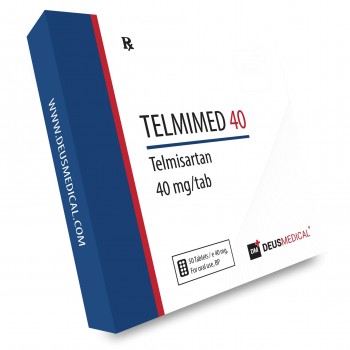


Telmisartan is mainly known for treating high blood pressure but new research suggests it can also slow down the growth of esophageal squamous cell carcinoma (ESCC). Helps stop cancer cells from dividing by causing S-phase arrest and lowering key proteins like cyclin A2 and CDK2. This means telmisartan could be a useful treatment for ESCC with benefits as a blood pressure medicine.
Matsui, T., Chiyo, T., Kobara, H., Fujihara, S., Fujita, K., Namima, D., Nakahara, M., Kobayashi, N., Nishiyama, N., Yachida, T., Morishita, A., Iwama, H., and Masaki, T. (2019) Telmisartan inhibits cell proliferation and tumor growth of esophageal squamous cell carcinoma by inducing S-phase arrest in vitro and in vivo', International Journal of Molecular Sciences.
Disclaimer: Information provided it this page is for general information only and does not substitute for professional medical advice.
For detailed information about TELMIMED 40 by Deus Medical, consult with your doctor or healthcare professional.


Matsui, T., Chiyo, T., Kobara, H., Fujihara, S., Fujita, K., Namima, D., Nakahara, M., Kobayashi, N., Nishiyama, N., Yachida, T., Morishita, A., Iwama, H., and Masaki, T. (2019) Telmisartan inhibits cell proliferation and tumor growth of esophageal squamous cell carcinoma by inducing S-phase arrest in vitro and in vivo', International Journal of Molecular Sciences.

Matsui, T., Chiyo, T., Kobara, H., Fujihara, S., Fujita, K., Namima, D., Nakahara, M., Kobayashi, N., Nishiyama, N., Yachida, T., Morishita, A., Iwama, H., and Masaki, T. (2019) Telmisartan inhibits cell proliferation and tumor growth of esophageal squamous cell carcinoma by inducing S-phase arrest in vitro and in vivo', International Journal of Molecular Sciences.

Matsui, T., Chiyo, T., Kobara, H., Fujihara, S., Fujita, K., Namima, D., Nakahara, M., Kobayashi, N., Nishiyama, N., Yachida, T., Morishita, A., Iwama, H., and Masaki, T. (2019) Telmisartan inhibits cell proliferation and tumor growth of esophageal squamous cell carcinoma by inducing S-phase arrest in vitro and in vivo', International Journal of Molecular Sciences.